B3U5 词汇导学案
新人教版英语必修三book3 unit5 重点单词导学案
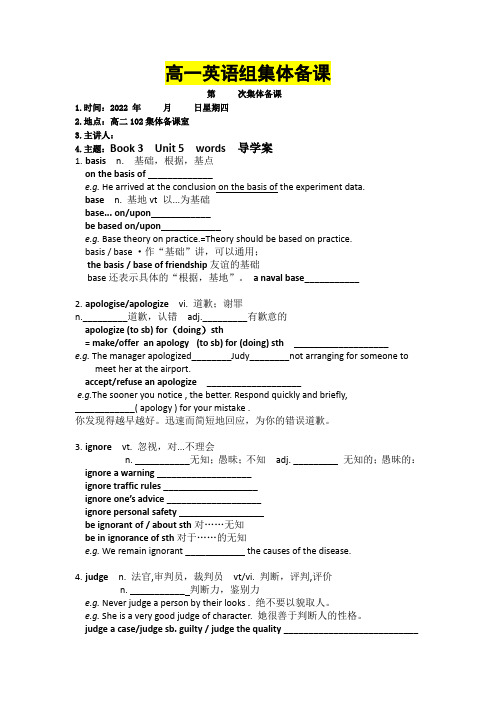
高一英语组集体备课第次集体备课1.时间:2022 年月日星期四2.地点:高二102集体备课室3.主讲人:4.主题:Book 3 Unit 5 words 导学案1.basis n. 基础,根据,基点on the basis of _____________e.g. He arrived at the conclusion on the basis of the experiment data.base n. 基地vt 以...为基础base... on/upon____________be based on/upon____________e.g. Base theory on practice.=Theory should be based on practice.basis/base·作“基础”讲,可以通用;the basis/base of friendship友谊的基础base还表示具体的“根据,基地”。
a naval base___________2.apologise/apologize vi. 道歉;谢罪n._________道歉,认错adj._________有歉意的apologize (to sb) for(doing)sth=make/offer an apology (to sb)for(doing) sth ___________________e.g. The manager apologized________Judy________not arranging for someone tomeet her at the airport.accept/refuse an apologize___________________e.g.The sooner you notice , the better. Respond quickly and briefly,____________( apology ) for your mistake .你发现得越早越好。
B3 U5 词汇导学案

高一英语Book Three 导学案 编号:21 使用时间: 2015 年 4 月 日 班级: 小组: 姓名: 组内评价: 教师评价:35制作:刘爱玲 审核:高一英语备课组【Learning aims 】1.通过练习帮助学生巩固本单元学习的新词汇和短语;2. 强化本单元所学词汇和短语的理解和运用;3. 从词的本身理解到词在语境中的运用,夯实语言基础。
【Important and difficult points 】To be able to use some key words and expressions. 【Directions 】请同学们在上课之前,以默写的形式提前完成预学案。
使用说明&学法指导:1、在预习时,先拼读本单元的词汇,对于拼读不确定及不会读的单词可查阅词典在组内合作解决或在早读时间解决。
2、完成时间:20分钟。
I. 重点单词(默写)1____________ n. 行李 2____________ prep. & adv. 在船、飞机、火车上 3____________ n. 大陆;陆地 4____________ adv.向东; adj.向东的 5____________ vt.& vi.包围; 环绕 6____________ vt.& vi.混合;调配7____________ vt.& vi 定居;解决;平静下来8__________ prep.在......之内; 不越出 9____________ vt&vi n.边界;国界与...接壤10____________ adv.稍稍;轻微地 11____________ n. 黎明;佛晓 12____________ vt.证实;批准 13____________ vt.使恐怖;恐吓 14____________ adj.市区的 adv.在市区 15____________ adv. 接近;大约 16____________ n. 传统;风俗 17____________ vt& n. 测量;措施 18____________ adj.富有的n.富人;有钱人19____________ n. 距离;远方 20____________ adj.宽阔的;广泛的;主要的 II.重点短语(写出汉语意思)1.定居;平静下来 ____________________2.不愿, 而不是 ___________________3. 在远处 ________________________4. 对…有天赋 ___________________5. 在市区 _____________________6. 看见;瞥见 _____________________使用说明&学法指导:1、利用《练习册》P94-105完成词汇学习。
高中必修选修学案UNI5,B3 语言运用导学案改
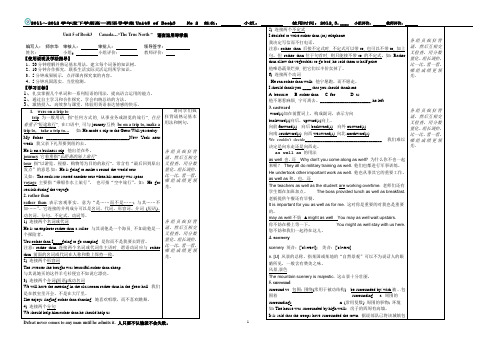
Unit 5 of Book3 Canada---“The True North ”语言运用导学案编写人:师宗华审核人:审批人:领导签字:姓名:小组:小组评价:教师评价:【使用说明及学法指导】1、20分钟理解并熟记基本用法,建立每个词条的知识树。
2、10分钟合作探究,联系生活实际灵活运用所学知识。
3、5分钟成果展示,点评课内探究案的内容。
4、5分钟巩固落实、当堂检测。
【学习目标】1、扎实掌握几个单词和一系列短语的用法,提高语言运用的能力。
2、通过自主学习和合作探究,学会归纳总结的方法。
3、激情投入,高效参与课堂,体验用英语表达情感的快乐。
1.were on a trip totrip为一般用语, 指”任何方式的, 从事业务或游览的旅行”, 往往着重于”短途旅行”, 在口语中, 可与journey互换. be on a trip to, make a trip to, take a trip to…如: He made a trip to the Great Wall yesterday. My father ______________________________________New York next week. 我父亲下礼拜要到纽约去。
He is on a business trip. 他出差在外。
journey它着重指”长距离的陆上旅行”.tour指”以游览、视察、购物等为目的的旅行”,常含有“最后回到原出发点”的意思.如:He is going to make a round-the-world tour.又如:The rock star started another tour when his money was spent. voyage主要指“乘船作水上旅行”,也可指“空中旅行”。
如:He got seasick during the voyage.2. rather thanrather than表示客观事实,意为“是……而不是……; 与其……不如……”。
高中英语人教版必修三导学案:unit5-2 Word版
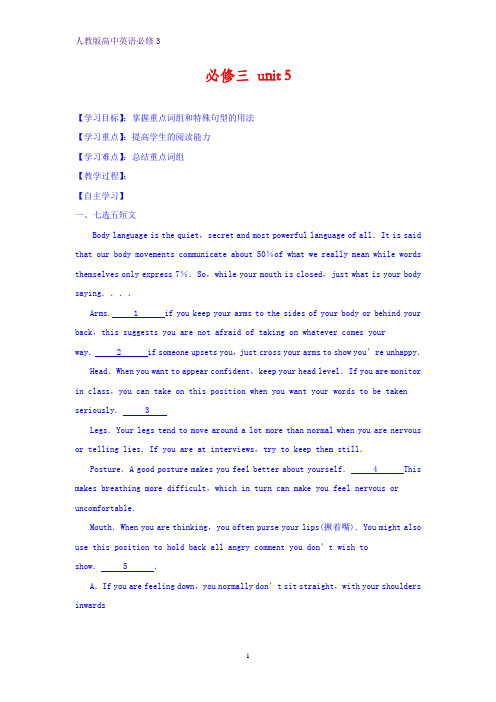
必修三unit 5【学习目标】:掌握重点词组和特殊句型的用法【学习重点】:提高学生的阅读能力【学习难点】:总结重点词组【教学过程】:【自主学习】一、七选五短文Body language is the quiet,secret and most powerful language of all.It is said that our body movements communicate about 50%of what we really mean while words themselves only express 7%.So,while your mouth is closed,just what is your body saying....Arms. 1 if you keep your arms to the sides of your body or behind your back,this suggests you are not afraid of taking on whatever comes your way. 2 if someone upsets you,just cross your arms to show you’re unhappy.Head.When you want to appear confident,keep your head level.If you are monitor in class,you can take on this position when you want your words to be taken seriously. 3Legs.Your legs tend to move around a lot more than normal when you are nervous or telling lies.If you are at interviews,try to keep them still.Posture.A good posture makes you feel better about yourself. 4 This makes breathing more difficult,which in turn can make you feel nervous or uncomfortable.Mouth.When you are thinking,you often purse your lips(撅着嘴).You might also use this position to hold back all angry comment you don’t wish toshow. 5 .A.If you are feeling down,you normally don’t sit straight,with your shoulders inwardsB.If you are pleased,your usually open your eyes wide and people can notice this.C.Outgoing people generally use their arms with big movements,while quieter people keep them close to their bodies.D.How you hold your arms shows how open and receptive you are to people you meet.E.However,it will probably still be noticed,and people will know you’re not pleased.F.However,to be friendly in listening or speaking,you must move your head a little to one side.G.Don’t say too much when you’re happy.二、阅读型完型One of my father's favorite 1 (say) as I was growing up was “Try it!”I couldn't say I didn't like something, 2 it might be, until after I tried it. Over the years I've come to realize how much of my success I owe tomy 3 (accept) of those words as one of my values. My first job was just oneI decided to try for a couple of years until I determined what I wanted to do asa career (职业). 4 (actual) I believed I would work for a few years,get 5 (marry), stay home and raise a family, so I didn't think the job I took mattered that much. I couldn't 6 more mistaken. I mastered the skills of that 7 (begin) level position and I was given the opportunity (机会) to move up through the company into 8 (differ) positions. I accepted each new opportunity with the thought, “Well, I'll try it; 9 I don't like it I can always go back to my 10 (early) position.” But I was with the same company for the past 28 years.1 2 3 4 56 7 8 9 10二、短文改错It is important to do with the rubbish in cities. Rubbish must be 1.________ treated properly. Thus, it may cause a lot of problems. It may pollute 2._________ the air and water. When people breathe the polluted air or drink polluted 3_________ water, we may get ill. Our city has begun to pay attention to the problem.4._____ As far as I know, some rubbish is sorted and sent to different factory. 5._________ Rubbish, such as old newspapers and glass, are recycled. Some harmful 6._________ rubbish is sent to a certain place and buried. Waste air is cleaned after it7._____ goes into the air. Waste water is treated before it poured into rivers. To 8._________ protect from the environment, the government has passed laws to 9.________ prevent people from throwing rubbish everywhere. We should do our 10._______ best to take good care of the environment and fight against pollution.。
Unit 5 sectionb3导学案
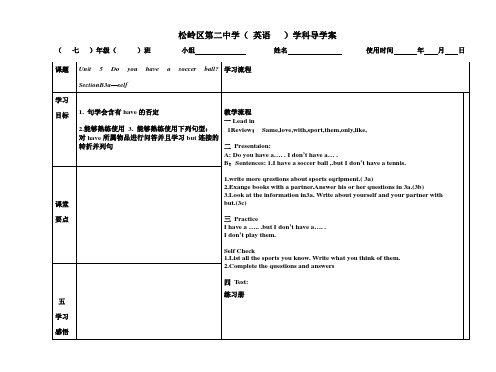
(七)年级()班小组姓名使用时间年月日
课题
Unit 5 Do you have a soccer ball? SectionB3a—self
学习流程
学习
目标
1.句学会含有have的否定
2.能够熟练使用3.能够熟练使用下列句型:
对have所属物品进行问答并且学习but连接的转折并列句
三Practice
I have a ….. .but I don’t have a…. .
I don’t play them.
Self Check
1.List all the sports you know. Write what you think of them.
plete the questions and answers
教学流程
一Lead in
1Review:Same,love,with,sport,them,only,like,
二Presentaion:
A: Do you have a…. . I don’t have a… .
B:Sentences: 1.I have a soccer ball ,.but I don’t have a tennis.
1.write more qrestions about sports eqripment.( 3a)
2.Exange books with a partner.Answer his or her questions in 3a.(3b)
3.Look at the information in3a. Write about yourself and your partner with but.(3c)
必修3Unit5单词导学案
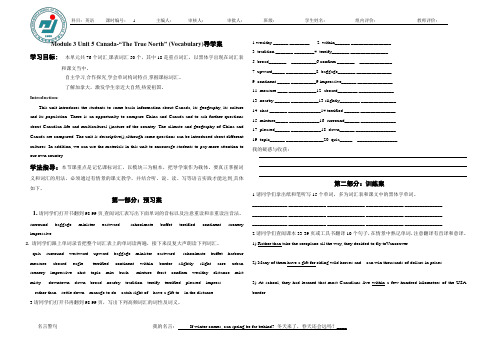
Module 3 Unit 5 Canada-“The True North” (Vocabulary)导学案学习目标: 本单元共76个词汇,课表词汇50个,其中18是重点词汇,以黑体字出现在词汇表和课文当中。
自主学习,合作探究,学会单词构词特点,掌握课标词汇。
了解加拿大,激发学生亲近大自然,热爱祖国。
Introduction:This unit introduces the students to some basic information about Canada, its geography, its culture and its population. There is an opportunity to compare China and Canada and to ask further questions about Canadian life and multicultural ()nature of the country. The climate and geography of China and Canada are compared. The unit is descriptive(),although some questions can be introduced about different cultures. In addition, we can use the materials in this unit to encourage students to pay more attention to our own country.学法指导:本节课重点是记忆课标词汇,以模块三为根本,把导学案作为载体。
要真正掌握词义和词汇的用法,必须通过有情景的课文教学,并结合听、说、读、写等语言实践才能达到,具体如下。
第一部分:预习案1.请同学们打开书翻到98-99页,查阅词汇表写出下面单词的音标以及注意重读和非重读注音法。
B3U5-词汇学案
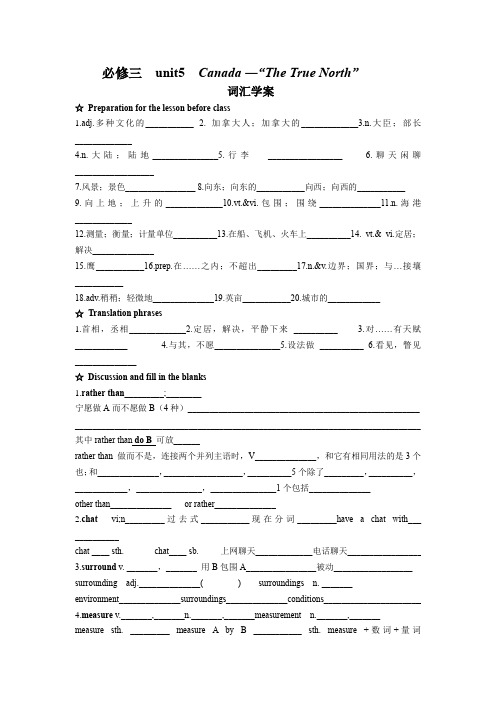
必修三unit5 Canada ―“The True North”词汇学案☆Preparation for the lesson before class1.adj.多种文化的___________2. 加拿大人;加拿大的_____________3.n.大臣;部长_____________4.n.大陆;陆地_______________5.行李_________________6.聊天闲聊__________________7.风景;景色________________ 8.向东;向东的___________向西;向西的___________9.向上地;上升的_____________10.vt.&vi.包围;围绕______________11.n.海港_____________12.测量;衡量;计量单位__________13.在船、飞机、火车上__________14. vt.& vi.定居;解决______________15.鹰___________16.prep.在……之内;不超出_________17.n.&v.边界;国界;与…接壤___________18.adv.稍稍;轻微地______________19.英亩___________20.城市的____________☆Translation phrases1.首相,丞相_____________2.定居,解决,平静下来__________3.对……有天赋____________4.与其,不愿_______________5.设法做__________6.看见,瞥见______________☆Discussion and fill in the blanks1.rather than_________;________宁愿做A而不愿做B(4种)_____________________________________________________ _______________________________________________________________________________其中rather than do B 可放______rather than 做而不是,连接两个并列主语时,V______________,和它有相同用法的是3个也;和______________,__________________,__________5个除了_________,__________,____________,_______________,_______________1个包括______________other than______________ or rather______________2.chat vi;n_________过去式___________现在分词_________have a chat with___ __________chat ____ sth. chat____ sb. 上网聊天_____________电话聊天________________ 3.surround v. _______,_______ 用B包围A________________被动__________________ surrounding adj.______________( ) surroundings n. _______environment______________surroundings______________conditions_____________________ 4.measure v._______,_______n._______,_______measurement n._______,_______measure sth. _________ measure A by B ___________ sth. measure +数词+量词______________E.g. 这条路量起来有500千米。
必修三第五模块知识点导学案
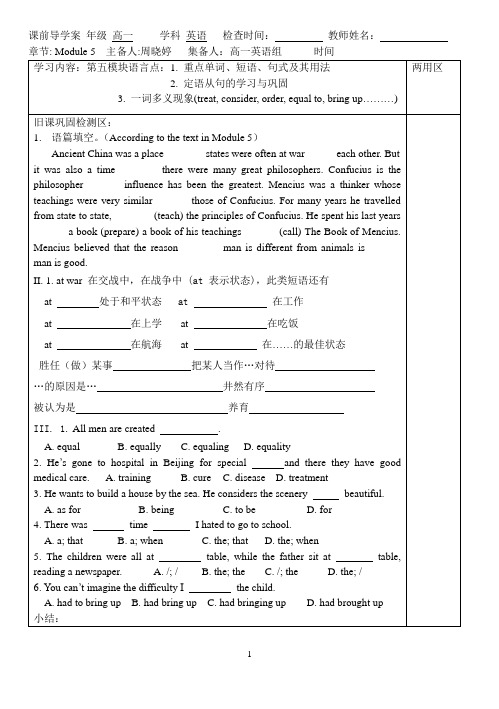
课前导学案年级高一学科英语检查时间:教师姓名:I.语篇填空:where; with; when; whose; to; teaching; preparing; called; why; thatII.1. peace, work, school, table, sea, one’s best2. be up/equal to ; treat…as; the reason why… is that…; in order/orderly;be considered… to be(n, adi); bring up; A D C B C C课前准备:1. The painting is considered to be valuable.He is considering my idea.Have you considered how to get there?2.井然有序,杂乱无章地,出了故障,奉命,在订购中(2)命令,点菜,订购3.对某人好/不好,把`。
当作。
对待He treated my plan as a joke. (2) 医生用药片给他退烧。
(3)He treated me to a film. cure第三页答案:1. 他们能力相当。
He is equal to the work.2. 答案略。
3. 定语;表语;why he broke down;that he worked4. humor, direction. 常识,有道理,在某种意义上说,了解。
的含义5.We can’t afford time and money. Are you able to afford your holiday6.对。
什么做出贡献查理。
卓别林对电影业做出了巨大贡献。
有助于,促进,contributes to7. 比。
更有优势,他以前的经历使他比其他求职者更有优势。
对。
有利,利用某人8. 最后,得出结论,使。
人教版(2019)新教材高中英语第三册第五单元词汇导学案
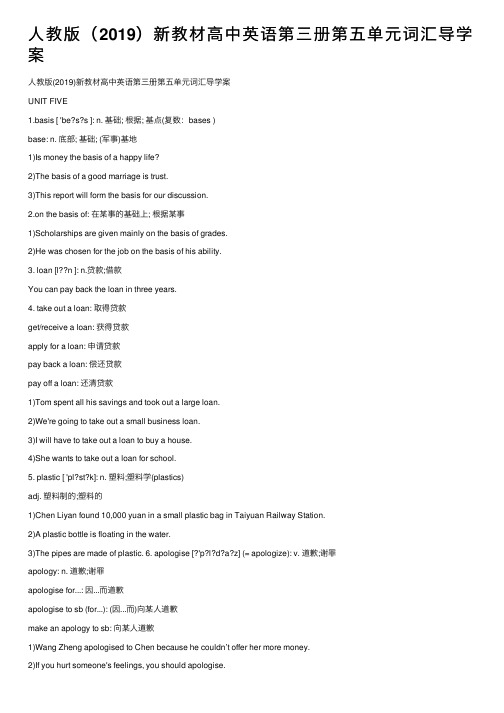
⼈教版(2019)新教材⾼中英语第三册第五单元词汇导学案⼈教版(2019)新教材⾼中英语第三册第五单元词汇导学案UNIT FIVE1.basis [ 'be?s?s ]: n. 基础; 根据; 基点(复数:bases )base: n. 底部; 基础; (军事)基地1)Is money the basis of a happy life?2)The basis of a good marriage is trust.3)This report will form the basis for our discussion.2.on the basis of: 在某事的基础上; 根据某事1)Scholarships are given mainly on the basis of grades.2)He was chosen for the job on the basis of his ability.3. loan [l??n ]: n.贷款;借款You can pay back the loan in three years.4. take out a loan: 取得贷款get/receive a loan: 获得贷款apply for a loan: 申请贷款pay back a loan: 偿还贷款pay off a loan: 还清贷款1)Tom spent all his savings and took out a large loan.2)We're going to take out a small business loan.3)I will have to take out a loan to buy a house.4)She wants to take out a loan for school.5. plastic [ 'pl?st?k]: n. 塑料;塑料学(plastics)adj. 塑料制的;塑料的1)Chen Liyan found 10,000 yuan in a small plastic bag in Taiyuan Railway Station.2)A plastic bottle is floating in the water.3)The pipes are made of plastic. 6. apologise [?'p?l?d?a?z] (= apologize): v. 道歉;谢罪apology: n. 道歉;谢罪apologise for...: 因...⽽道歉apologise to sb (for...): (因...⽽)向某⼈道歉make an apology to sb: 向某⼈道歉1)Wang Zheng apologised to Chen because he couldn’t offer her more money.2)If you hurt someone's feelings, you should apologise.3)You should apologize for your mistake.7. ignore [?ɡ'n??(r)]: v. 忽视;对…不予理会leave/let…alone/be: 不打扰...; 不惊动...leave alone: 更不⽤说1)Also, while listening don’t ignore the speakers’ tone and intonation----these can beimportant clues. too2)She ignored him and carried on with her work.3)The government has ignored his views on the project.8. in return(for...): 作为回报;作为回应in turn: 依次; 轮流; 转⽽1)When we help someone, should we expect to get something in return?2)He sent me a present; I should give him something in return.3)In return, they expect you to work hard and make a contribution to the factory.4)She will buy you a car in return for your help in the past.5)If we drive in turn, we will not be tired.9. judge [d??d? ]: v. 评价;评判;判断n. 法官; 审判员; 裁判员judgement/judgment : n. 判断(⼒); 判决; 评价judging by/from…: 从…判断coach: n. 教练athlete/ player : n. 运动员- 1 -1)Should we judge people based on how much money they have?2)Don't judge a book by its cover. 不要以貌取⼈。
高中英语必修3 unit 5 学案 - 词汇

高效英语课堂导学案学案名称:高中英语(人教版Book3 Unit5 Words and expressions班级:小组:姓名:学号:评价:★学习目标1.知识目标:学会单词的正确发音;牢记单词的拼写;灵活运用黑体单词的用法。
2.技能目标:学会在情景中记忆单词,把单词放到例句中记住其意思和用法。
3.情感目标:提高学生学习单词的兴趣。
★重点和难点1. 重点:掌握单词的正确发音、意思和用法;2. 难点:在语境中灵活运用单词。
1. rather than 常连接两个并列结构【寓词于境】读下列句子,自我归纳rather than的用法:(1 He is a singe r rather than a composer.(连接两个(2 He, rather than you, is on duty today. (连接两个★连接两个主语时,谓语动词与rather than 前面的主语保持一致。
(3 I decided to write rather than ( to telephone. = Rather than telephone Idecided to write. (连接两个★其后接不定式时,可带to ,也可不带to,但当rather than 位于句首时只跟不带to 的不定式。
(4 She likes dancing rather than singing.(连接两个【自我归纳】rather than可连接并列成分,如:名词、等词。
【拓展】熟记以下内容:other than 除……以外or rather 更确切地说“宁愿做……不愿做……”:would rather do …than do … = would do … rather than do …prefer to do … rather than do … = prefer doing …to doing …2. chat vi.&n.【寓词于境】(1 What were you chatting to him about?(2 I had a long chat with her about her job.【自我归纳】chat sb. sth. = have a chat sb. sth. 与某人聊某事chat sb. 与某人聊天chat sth. 闲聊某事【考例】She likes to chat Grandma every detail of her life over the phone.A. about; withB. about; aboutC. with; aboutD. with; with3. surround vt.&vi. 包围;围绕【寓词于境】翻译下列句子(1 Trees surround the pond.(2 The police surrounded the house.(3 As a child, I was surrounded by love and kindness.【自我归纳】surround...with... 用……包围……be surrounded by/with...【拓展】surrounding adj. 周围的,附近的短语:周围地区surroundings (常用pl.环境 e.g. W e are living in pleasant surroundings.4. measure【寓词于境】写出下列各句中measure 的意思(1 vi.&vt. ①②Our classroom measures 10 meters by 8 meters.It’ s hard to measure his ability when we haven’ t seen his work s.。
高中英语人教版必修第三册Unit5WordsandExpressions单词导学案

Book3 Unit 5 Words and Expressions导学案一、词性转换1. base v. 以…为据点;以…为基础n.底部;根据→based adj. 以(某事)为基础的;以……为重要部分(或特征)的→basic adj.基本的;基础的→basis(pl.bases) n. 基础;根据;基点(复数)2. apology n. 道歉;谢罪→apologize/apologise vi.道歉;谢罪3. ignore vt.忽视;对……不予理会→ignorance n.无知;愚昧→ ignorant adj.无知的4. judge vt.&vi.评价;评判;判断n.法官;审判员;裁判员→judgement n. 判决;判断5.serve vt.提供(食物),端上(饭菜);服务→servant n.仆人;用人→service n.服务6. sail vi.&vt.(船)航行;(人)乘船航行→sailor n.水手,海员7. patient adj.有耐心的→patience n.耐心;忍耐力;毅力8. indicate vt.&vi.表明;显示vt.象征;暗示→indication n. 象征;迹象;标示9.intend vi.&vt.打算;计划;想要→intention n.打算;计划;意图;目的10. music n.音乐;乐曲→musical n.音乐剧adj.音乐的→ musician n.音乐家11. hesitate vi. 犹豫;迟疑;顾虑→ hesitation n. 犹豫12. eventual adj.最后的;最终的→eventually adv.最后;终于13. option n. 可选择的事物;选择;选择权→optional adj.可选择的14. willing adj.愿意;乐意→willingnessn.愿意;心甘情愿→ unwilling adj.不愿意的;不乐意的15. permit v允许;准许;使有可能→permission n.准许;许可;批准;许可证16. normal adj. 典型的;正常的;一般的n. 常态;通常标准→normally adv. 通常17. narrator n.叙述者;幕后解说员→narration n.叙述;解说→narrate v.叙述18. obligation n.义务;职责→obligate v.强迫;迫使→obligated adj.有义务的;有责任的二.用所给词的适当形式填空。
高一英语Book3Unit5词汇导学案全面版
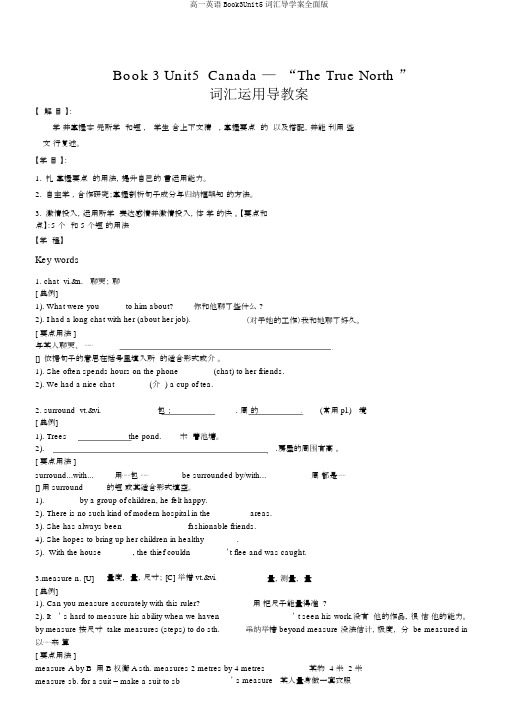
Book 3 Unit5 Canada—“The True North”词汇运用导教案【解目】:学并掌握本元所学和短,学生合上下文猜,掌握要点的以及搭配,并能利用些文行复述。
【学目】:1.扎掌握要点的用法,提升自己的言运用能力。
2.自主学,合作研究;掌握剖析句子成分与归纳框架知的方法。
3.激情投入,运用所学表达感情并激情投入,体学的快。
【要点和点】:5 个和 5 个短的用法【学程】Key words1. chat vi.&n. 聊天;聊[ 典例]1). What were you _____ to him about?你和他聊了些什么 ?2). I had a long chat with her (about her job).(对于她的工作)我和她聊了好久。
[ 要点用法 ]与某人聊天、⋯⋯ ___________________________________________________[] 依据句子的意思在括号里填入所的适合形式或介。
1). She often spends hours on the phone _______ (chat) to her friends.2). We had a nice chat _______ (介) a cup of tea.2. surround vt.&vi.包; _____________. 周的 _____________ (常用 pl.) 境[ 典例]1). Trees _____________ the pond.木着池塘。
2). ____________________________________________________.房屋的周围有高。
[ 要点用法 ]surround...with...用⋯⋯包⋯⋯be surrounded by/with...周都是⋯⋯[] 用 surround的短或其适合形式填空。
人教高中英语必修3 Unit5 Using language 导学案设计 无答案
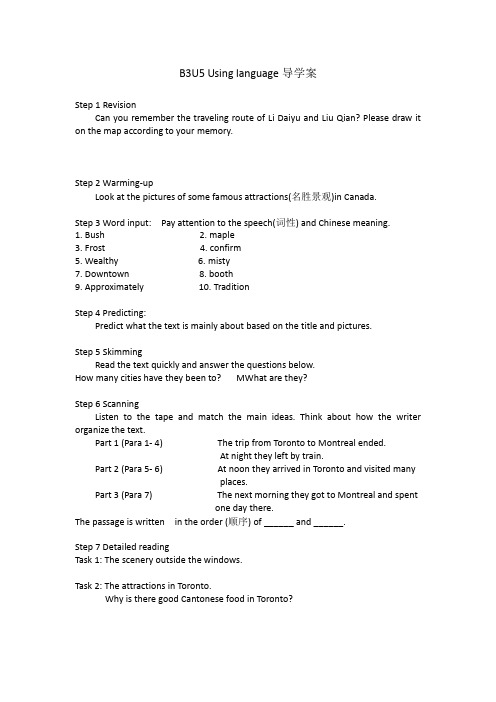
B3U5 Using language导学案Step 1 RevisionCan you remember the traveling route of Li Daiyu and Liu Qian? Please draw it on the map according to your memory.Step 2 Warming-upLook at the pictures of some famous attractions(名胜景观)in Canada.Step 3 Word input: Pay attention to the speech(词性) and Chinese meaning.1. Bush2. maple3. Frost4. confirm5. Wealthy6. misty7. Downtown 8. booth9. Approximately 10. TraditionStep 4 Predicting:Predict what the text is mainly about based on the title and pictures.Step 5 SkimmingRead the text quickly and answer the questions below.How many cities have they been to? MWhat are they?Step 6 ScanningListen to the tape and match the main ideas. Think about how the writer organize the text.Part 1 (Para 1- 4) The trip from Toronto to Montreal ended.At night they left by train.Part 2 (Para 5- 6) At noon they arrived in Toronto and visited manyplaces.Part 3 (Para 7) The next morning they got to Montreal and spentone day there.The passage is written in the order (顺序) of ______ and ______.Step 7 Detailed readingTask 1: The scenery outside the windows.Task 2: The attractions in Toronto.Why is there good Cantonese food in Toronto?Task 3: Three things show that Montreal is a French city.Task 4 Find out the girls’ traveling route(路线).Step 8 Group work1. Work in groups of four and draw the girls’ route across Canada on the map.2.Write down some places that are mentioned in the text.Step 8 RetellingTry to use your own language to retell the girls’trip from Toronto to Montreal according to the map. Work with your partner.Step 9 Assignment1. Try to arrange a seven-days traveling plan to Canada for the coming summer holiday. You can refer to the girls’ traveling route.2. Write down report about the two or three most impressive things during the trip across Canada.。
必修三unit5词汇导学案
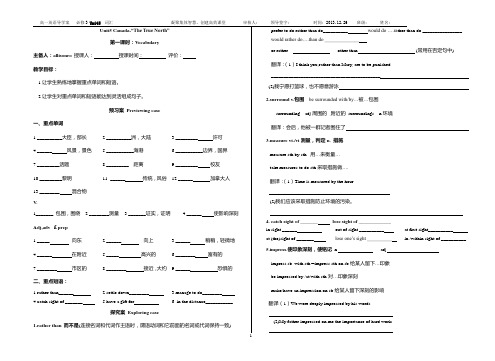
高一英语导学案 必修3 Unit5 词汇 凝聚集体智慧,创建高效课堂 审核人: 领导签字: 时间:2013.12.26 班级: 姓名:- 1 -Unit5 Canada-“The True North”第一课时:Vocabulary主备人:allisonro 授课人: 授课时间: 评价: 教学目标:1.让学生熟练地掌握重点单词和短语。
2.让学生对重点单词和短语能达到灵活组成句子。
预习案 Previewing case一、重点单词1.__________大臣,部长2.__________洲,大陆3._________ 许可4.______ 风景,景色5.___________海港6.___________边界,国界7._________话题8._________ 距离9._________ 校友 10._________黎明 11.-______ 传统,风俗 12.______ 加拿大人13.________ 混合物V .1_______ 包围,围绕 2.________测量 3._______证实,证明 4.______ 使影响深刻Adj,adv £prep 1._____ 向东 2.______ 向上 3.______ 稍稍,轻微地 4.______ 在附近 5._____ 高兴的6.________ 富有的7.________ 市区的 8.________ 接近,大约 9.______ 恐惧的二、重点短语:1.rather than______2.settle down________3.manage to do________4.catch sight of _______5.have a gift for6. in the distance___________探究案 Exploring case1.rather than 而不是(连接名词和代词作主语时,谓语动词和它前面的名词或代词保持一致) prefer to do rather than do__________ would do ….ra ther than do ________________ would rather do….than do ______________or rather other than .(常用在否定句中) 翻译:(1)I think you,rather than Mary, are to be punished.____________________________________________ (2)我宁愿打篮球,也不愿意游泳 2.surround v.包围 be surrounded with/by…被…包围surrounding adj.周围的 ,附近的 surroundings n.环境翻译:会后,他被一群记者围住了 3.measure vt./vi 测量,判定n. 措施 measure sth.by sth. 用…来衡量…take measures to do sth.采取措施做…. 翻译:(1)Time is measured by the hour.(2)我们应该采取措施防止环境的污染。
- 1、下载文档前请自行甄别文档内容的完整性,平台不提供额外的编辑、内容补充、找答案等附加服务。
- 2、"仅部分预览"的文档,不可在线预览部分如存在完整性等问题,可反馈申请退款(可完整预览的文档不适用该条件!)。
- 3、如文档侵犯您的权益,请联系客服反馈,我们会尽快为您处理(人工客服工作时间:9:00-18:30)。
Book 3 Unit5 语言点导学案(2课时)Class:________ Name: 组内评价:教师评价:【学习目标】1.知识与能力:To read the new words fluently and pronounce them correctly.To master the usage of key words and phrases.2过程与方法:To master the key words and phrases by group –cooperation and slf-directed study 3.情感态度价值观:To enjoy the pleasure of study.【学习重点】To master the usage of key words and phrases .【学案使用说明】请同学们熟读unit5课后单词,结合词典完成此学案。
【自学词汇】1. Multicultural_____________________, multi-___________________Multiparty _______________, multipurpose_________________Multinational ______________, multidirectional__________2. Canadian n. _____________(pl)_____________ adj.________ _________Canada_____________3. governor n.__________________ government n. _____________ govern v._______________4. luggage n.=baggage n._______________5. scenery n.(u) _______________ scene n.__________________________6. harbour n.=harbour.______________7. acre n._________ foot n._______________ (pl)________inch n.________ mile n.______________8. wealthy adj.________________ n._________________healthy adj.______________ n.___________________9. schoolmate n.________________ classmate ____________Workmate ____________________ roommate _________________10. dawn n.___________ daybreak n.____________ nightfall .____________sunset n.________ sunrise ___________11.approximately adv. ____________approximate adj._________12.tradition n.___________ traditional adj.__________13.distance n. ___________ distant adj. __________14.slightly adv. __________ slight adj.___________【重点词汇】1.Canada is a multicultural country. 加拿大是一个多元文化的国家。
multi-是一个前缀,意为“多”multimedia __________ multinational____________multiparty___________ multicolored__________2. Li Daiyu and her cousin Liu Qian were on a trip to Canada to visit their cousins on the Atlantic coast.trip: (通常指短途的)行走,旅行(尤指娱乐性的)[重点用法]be on a trip to____________make/take a trip to____________[练习] 1)He is on a business trip. ______________________________2) 我父亲下礼拜要到纽约去。
_______________________________3. Rather than take the aeroplane all the way, they decided to fly to Vancouver and...rather than 是一个连词词组,表示“而不是……;与其……(宁愿/不如……”. )常用于连接两个并列成分.它连接的两个并列成分可以是名词、代词、形容词、介词(短语)、动名词、分句、不定式、动词等。
You rather than I are going to go camping.He ran rather than walked.The sweater she bought was beautiful rather than cheap.We will have the meeting in the classroom rather than in the great hall。
She enjoys singing rather than dancing.I decided to write rather than (to) telephone.注意:rather than 后接不定式时,不定式可以带to,也可以不带to, 如上句。
但rather than 位于句首时,则只能接不带to 的不定式。
eg. I decided to walk rather than (to) ride a bike.Rather than ride a bike,I decided to walk.[重点用法]do A rather than do B = rather than do B, sb. does A 某人不做B却做Awould rather do A than do B = ________________________ 宁可做A而不做Bprefer to do A rather than do B 最喜欢做A而不做Bwould rather sb. did/had done sth. 宁愿某人做某事[练习] 根据句子意思及要求填空或翻译。
1). He came running all the way ______ ______walking.2). Rather than ______ (ride) on a crowded bus, he always prefers ______ (ride) a bicycle.3). I’ d rather you ______ ______ (not come) yesterday.4). She likes to keep things in the house ______ ______ throw them away, though many are useless.5). I think Tom, ______ ______ you, ______ ______ ______ (blame).6). 他宁愿死也不愿在街上乞讨。
_____________________________________________ 4. chat vi.&n. 聊天;闲聊1). What were you chatting to him about? 你和他聊了些什麽?2). I had a long chat with her (about her job).(关于她的工作)我和她聊了很久。
[重点用法]chat to/with sb (about sth) = have a chat with sb (about sth)__________________________________[练习] 根据句子的意思在括号里填入所给词的适当形式或介词。
1). She often spends hours on the phone _______ (chat) to her friends.2). We had a nice chat _______ (介词) a cup of tea.5. eastward(s) adv.向东adj.向东的, 朝东的1). They were traveling eastward(s) to the city which appeared in their dreams.2). The plane flied in an eastward direction.注意:不能说go to eastward, 而应说go eastward[发散思维]westward(s) adv. _______ southward(s) adv. ________northward(s) adv. ________ southeastward(s) adj./adv. ________forward(s) adv. _______ backward(s) adv. ________upward(s) adv. ________ downward(s) adv. ________sideward(s) adv. ________[练习] 根据句子的意思在括号里填入适当的词。
1). It is said that Tangseng and his four apprentices(徒弟) traveled ________ in order to obtain the sacred Buddhist scripture.2). When winter comes, the migratory birds travel in an __________ direction.6. People say it is Can ada’s most beautiful city, surrounded by mountains on the north and east and the Pacific.surround vt. 包围,环绕,围绕[重点用法]surround sb/sth with sb/sth _______________sth/sb be sourrounded by/with sth _________________[练习] 用surround的短语或其适当形式填空。
